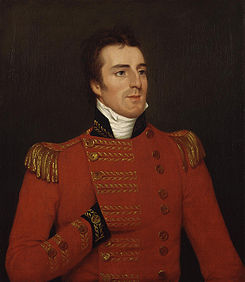Difference between revisions of "Duke of Wellington (NTW Character)"
Simetrical (talk | contribs) (Deleting {{EIP}}) |
Lysimachus (talk | contribs) (NOT FINISHED - Lysimachus) |
||
| Line 35: | Line 35: | ||
==History== | ==History== | ||
| + | |||
| + | Arthur Wellesley was born in Ireland in the year 1769. He signed up for the British Army in 1787, serving as an Aide-de-Camp for two consecutive judiciaries of Ireland. Soon enough he left his home country and was assigned to the Netherlands with the 33rd Regiment to join the Duke of York in an invasion of France. He was promoted to a brigade command during the campaign and would take part in actions around Breda (prior to the Battle of Boxtel) and defending the Waal River. Despite this, the campaign concluded unsuccessfully, and in March 1795, Arthur Wellesley sailed back to England. Nonetheless, he had learned crucial lessons throughout his time in Flanders and these would inevitably be put to use in later life. | ||
| + | |||
| + | Although offered the position of Surveyor-General of the Ordnance by the new judiciary of Ireland (Lord Camden), he refused the post and soon returned back to his old regiment at Southampton, upon which he proceeded to sail to the West Indies. After seven weeks at sea, a storm forced them to turn back, but a few months later after a promotion to the rank of Colonel, Arthur Wellesley set out with the 33rd Regiment to Calcutta. | ||
| + | |||
Revision as of 11:08, 3 May 2010
Arthur Wellesley, later, the Duke of Wellington was a Coalition Commander during the Napoleonic Wars
History
Arthur Wellesley was born in Ireland in the year 1769. He signed up for the British Army in 1787, serving as an Aide-de-Camp for two consecutive judiciaries of Ireland. Soon enough he left his home country and was assigned to the Netherlands with the 33rd Regiment to join the Duke of York in an invasion of France. He was promoted to a brigade command during the campaign and would take part in actions around Breda (prior to the Battle of Boxtel) and defending the Waal River. Despite this, the campaign concluded unsuccessfully, and in March 1795, Arthur Wellesley sailed back to England. Nonetheless, he had learned crucial lessons throughout his time in Flanders and these would inevitably be put to use in later life.
Although offered the position of Surveyor-General of the Ordnance by the new judiciary of Ireland (Lord Camden), he refused the post and soon returned back to his old regiment at Southampton, upon which he proceeded to sail to the West Indies. After seven weeks at sea, a storm forced them to turn back, but a few months later after a promotion to the rank of Colonel, Arthur Wellesley set out with the 33rd Regiment to Calcutta.
Significant Events
Ranks Held
- 7 March 1787 - Ensign (73rd Regiment of Foot)
- October 1787 - Aide-de-Camp (73rd Regiment of Foot)
- 25 December 1787 - Lieutenant (76th Regiment of Foot)
- June 1789 - Lieutenant (12th Light Dragoons)
- 1791 - Captain (18th Light Dragoons)
- 1793 - Major (33rd Regiment of Foot)
- September 1793 - Lieutenant Colonel (33rd Regiment of Foot)
- 1796 - Colonel (33rd Regiment of Foot)
- 1802 - Major General (33rd Regiment of Foot)
- 30 September 1807 - Lieutenant General
- 1814 - Field Marshal
